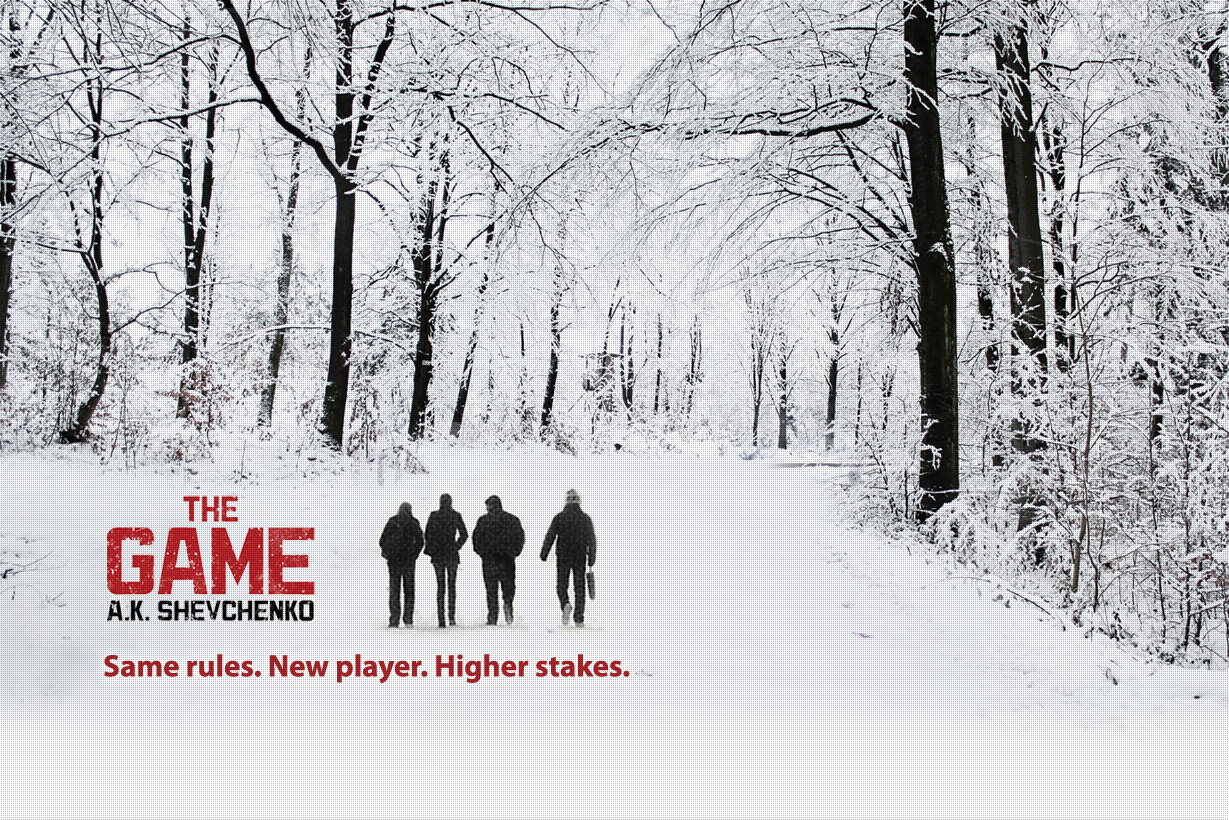THE GAME NOVEL
WRITER'S NOTE
Every morning when writing The Game, I couldn’t wait to rush back to my laptop, to see what Tony, Jonty, Levi and Alex were up to next. I felt so incredibly lucky to join them on their adventure, to watch the game they started 25 years ago. They wouldn’t know the final outcome until each of them had completed their own task – but wasn’t that always the thrill?The book opens as they are summoned for a meeting at Waterloo Station by Tony, the mastermind of the game they played as teenagers. But now the stakes are much higher: in order lift the burden of a shared dark secret, they must reopen a forgotten page of history and revisit February 1945, when three world leaders gathered in Crimea to agree a new world order. This time the scale of the game is different too. Driven by love, loss and loyalty, they are playing across continents. I travelled with them, following the anagram TONY’S – Train, taxi and Tube; Odessa, New York and Strasbourg – gradually uncovering the story of the teenage game that ended in tragedy, the truth about the war conference, and the secrets that could shake up the world today...
I watched the characters laugh and fight, joined them in their thrill of discovery, felt the warmth of their love and the depth of their despair. They are all very much alive for me, and I really miss them and their meetings at Waterloo – but when readers tell me that they can relate to Tony and Levi, fall in love with Alex or see themselves in Jonty, it means they are alive for them too…
Yet The Game for me is not just a thriller about the unearthing of historical secrets, nor is it just the story of a teenage game gone wrong. I wanted to write a thriller with a heart – a book about the pages of history coming to life as personal stories and personal journeys of discovery; about every character ‘waging his own war’ and learning to win.
I always found fascinating the way our childhood games and relationships mould us as grown-ups, and how dealing with our mistakes, our past, makes us who we are now. While researching the book, I interviewed dozens of teenage boys about their secrets and aspirations and many grown-up men about how those teenage dreams, games, and disappointments affected them in life. As a result, I hope this book is both one which fathers and teenage sons can read together, and also a love story women can find strength in (though I was told by a couple of men who read it that they shed a tear…)
Every time I am at Waterloo now, I slow down under the station clock, looking for Tony, Jonty, Levi and Alex. I know that after joining them in their life-changing game, my commute will never be the same again. They are there, close to me, to all of us, plotting another game… I hope you will feel it, too, after reading The Game.
‘Odessa is not a port, it is a passport…’
It took me forty years to return to Odessa. The last time I visited, I was on holiday as a child, and all I remember is warm sand under my feet, the taste of the corn sold by the beach vendors, and a gypsy choir singing in one of the restaurants…There are several legends about the naming of Odessa. As I walked through the streets of the city again, taking in its energy, I decided that this one is my favourite. In 1794, when Catherine the Great was wondering what to call the new southern port of her Empire, somebody suggested the name ‘Odessos’, after the Greek colony on the shores of the Black Sea.
‘Make it Odessa,’ the Empress said curtly. ‘I am the one who decided to build this city, so give its name a feminine ending and the heart of a woman.’ Odessa remains Catherine’s lady-in-waiting: warming her aching bones on the beaches of Arcadia and Lanjeron, covering the scars of pogroms and wars, she still has an air of grandeur, holding to the memories of her great past.
She remembers the times when she welcomed adventurers and traders from around the world, mixing languages, cuisines, cultures. She wore French fashions, ate in Viennese patisseries, lived in Italianate mansions, learned to communicate in Greek and Turkish, German and Armenian, blending Russian words with Yiddish grammar. This freedom of trade brought with it a freedom of sprit, and, with a French Duke and then a former Ambassador to Britain as Governors, Odessa acquired European manners too.
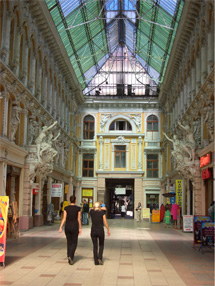 
The centre of Odessa

The centre of Odessa
Somebody had to serve the wealthy European lady and occasionally rob her of her jewels, so another Odessa was born in the outskirts of Moldavanka, the place of the Moldovan settlement: a cleaner, a cook and a maid. She worked eighteen-hour days, this Odessa, supporting her children and her man, a port worker or a tailor, a shoemaker or a gangster.
This Odessa lived in the overflowing two-storey annexes with rickety verandas, and celebrated and cried in the courtyards at the long communal tables built in the middle for weddings and wakes. Here the open-air theatre of love, jealousy and anger was of a passionate intensity unknown in the elegant gilded Opera House in the city centre. 
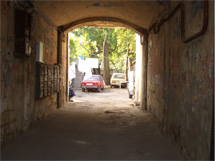 Moldavanka
Moldavanka
The con artists from the whole Russian Empire, and then the Soviet Union, flocked here and called Odessa their ‘Mama’: it was easier to escape here, to hide in the miles of catacombs and caves under the city and in the overcrowded houses of Moldavanka. Some of the houses even had (and still have) a door from the cellar or the kitchen straight into the catacombs. 
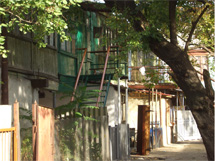 A Moldavanka courtyard
A Moldavanka courtyard
Odessa’s ‘upstairs-downstairs’ scenario was fluid – in a city of opportunists fortunes were made and lost quickly, propelling those who were lucky into the leafy aristocratic centre and dragging the bankrupts and the gamblers down to Moldavanka to take their place. Odessa learned to survive, laughing at her own misfortunes, giving birth to the unique Odessa humour – self-deprecating, black, ironic, full of rhetorical questions and double meanings.
The Jewish New Yorker jokes were fed by Odessa humour. The World Club of Odessites thrives on it and for the last forty years the whole city has lived from one April Fool’s Day Humour Festival to another. The International Clown Festival, the radio station dedicated to humour only, the Carnival of ‘RiO– de-ssa…’ are all here. This city knows how to laugh, cutting through Soviet censorship and the bitter sadness of emigration.
It is almost impossible to translate Odessa humour – it is often in the intonation or pauses – and it is everywhere around you: in the announcements on the beach (‘The Arcadia beach has a café, toilet and shower! Our beach has the same facilities plus a working shower…’); in street signs (“Are you lost? You don’t need a map, you need counselling! Come to our centre around the corner’); in the shops (‘One coin for a pill, ten coins for a pile of pills!’ on the door of a pharmacy…).
As I walked through the old city, I lost count of the funny signs, but was also surprised at the number of monuments and memorial plaques to writers, painters, musicians. What is it about Odessa that has made it so appealing not just to the con artists, but to the real ones as well?
Maybe it is Odessa’s rhythm – life here rolls on the beach with the waves, sways with jazz in the evenings, mixing the ’20s Dixieland music with folk Klezmer melodies and the nostalgic songs from the ’50s played in many restaurants.
Or maybe it is the food? You have to taste what Odessa is cooking. Fusion cuisine was invented here, in its cultural melting pot, two centuries before it became fashionable: French desserts are served after hearty Ukrainian soups; Jewish herring forshmack competes with Mediterranean meze-style starters. ‘Why did you return to Odessa?’ I asked Marina, the owner of the Gogol Mogol café, who had spent twenty years in New York.
She sat down with me for a piece of a cherry strudel and a coffee. ‘How come you don’t understand?!’ She looked shocked. ‘Odessa means everything to me! When I was in New York, I wasn’t living there, I was just waiting to come back…’
The Grande Dame Odessa is used to people leaving. She has lost count of how many ships she has seen off: the Black Sea merchant navy; the boats with the famous writers, philosophers and scientists thrown out of the country on Lenin’s orders in 1918; the war ships and the cruise liners; the Jewish Exodus in the 1970s and ’90s… 
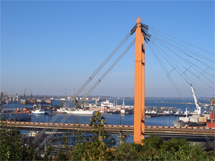 The port
The port
From the statue of the Duke Richelieu, her first Governor, at the top of the Potemkin steps, Odessa can see the port. She observes sailors, travellers and tourists, and knows that they will return – some after a few months, the others after many years. She watches, hoping that when they come back, she will feed them, guide them or even dance with them. Odessa remains a lady, still waiting. And she is still laughing.
